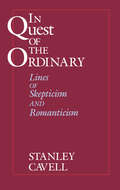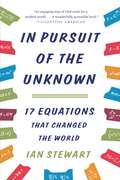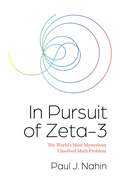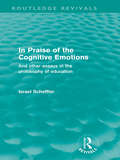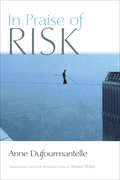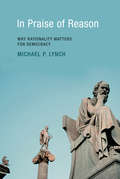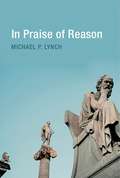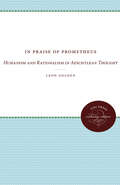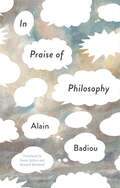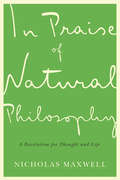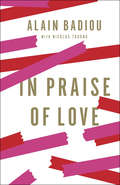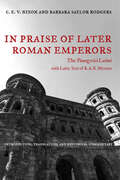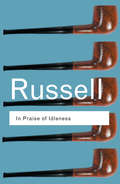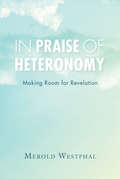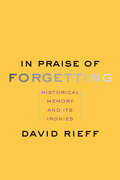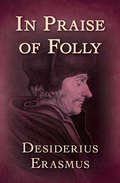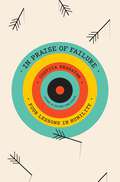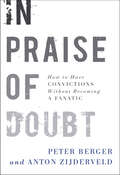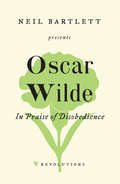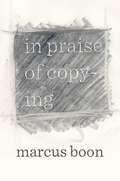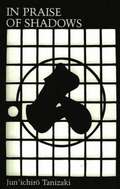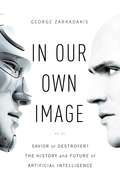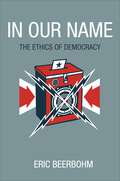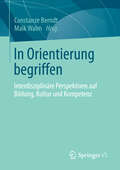- Table View
- List View
In Quest of the Ordinary: Lines of Skepticism and Romanticism
by Stanley CavellThese lectures by one of the most influential and original philosophers of the twentieth century constitute a sustained argument for the philosophical basis of romanticism, particularly in its American rendering. Through his examination of such authors as Emerson, Thoreau, Poe, Wordsworth, and Coleridge, Stanley Cavell shows that romanticism and American transcendentalism represent a serious philosophical response to the challenge of skepticism that underlies the writings of Wittgenstein and Austin on ordinary language.
In Pursuit of the Unknown: 17 Equations That Changed the World
by Ian StewartFor general readers of science and technology titles, this engaging work on the meaning and impact of mathematical equations examines seventeen of the most important equations in history and explores not only the science behind the specific formulas, but also the wide influence of these germinal ideas on modern technologies and scientific study. Covering popular equations such as the Pythagorean theorem and Relativity, as well as more obscure and advanced topics, the work provides an entertaining journey through the development of theoretical mathematics, as well as an informative look at applied science. Numerous tables, graphs, and illustrations are provided throughout. Stewart is professor emeritus of mathematics at Warwick University. Annotation ©2012 Book News, Inc. , Portland, OR (booknews. com)
In Pursuit of Zeta-3: The World's Most Mysterious Unsolved Math Problem
by Paul J. NahinAn engrossing look at the history and importance of a centuries-old but still unanswered math problemFor centuries, mathematicians the world over have tried, and failed, to solve the zeta-3 problem. Math genius Leonhard Euler attempted it in the 1700s and came up short. The straightforward puzzle considers if there exists a simple symbolic formula for the following: 1+(1/2)^3+(1/3)^3+(1/4)^3+. . . . But why is this issue—the sum of the reciprocals of the positive integers cubed—so important? With In Pursuit of Zeta-3, popular math writer Paul Nahin investigates the history and significance of this mathematical conundrum.Drawing on detailed examples, historical anecdotes, and even occasionally poetry, Nahin sheds light on the richness of the nature of zeta-3. He shows its intimate connections to the Riemann hypothesis, another mathematical mystery that has stumped mathematicians for nearly two centuries. He looks at its links with Euler’s achievements and explores the modern research area of Euler sums, where zeta-3 occurs frequently. An exact solution to the zeta-3 question wouldn’t simply satisfy pure mathematical interest: it would have critical ramifications for applications in physics and engineering, such as quantum electrodynamics. Challenge problems with detailed solutions and MATLAB code are included at the end of each of the book’s sections.Detailing the trials and tribulations of mathematicians who have approached one of the field’s great unsolved riddles, In Pursuit of Zeta-3 will tantalize curious math enthusiasts everywhere.
In Praise of the Cognitive Emotions: And Other Essays in the Philosophy of Education (Routledge Revivals)
by Israel SchefflerFirst published in 1991, In Praise of Cognitive Emotions comprises fourteen of Scheffler's most recent essays – all of which challenge contemporary notions of education and rationality. While defending the ideal of rationality, he insists that rationality not be identified with a mental faculty or a mechanism of inference but taken rather as the capactity to grasp principles and purposes and to evaluate them in the light of relevant reasons. Examining a broad range of issues – from computers in school to math education, from metaphor to morality – these essays are unified by Scheffler's conviction of the primacy of critical thought in education. Scheffler is especially concerned to promote a broad interpretation of rationality to counteract the narrowing of vision accompanying the technological revolution now sweeping education. Addressing three specific areas of curriculum, the work offers a critique of computer applications to education, develops a notion of strategic rationality in understanding mathematical reasoning, and, contrary to prevalent notions of moral education, connects reason with care, thus emphasizing the intimate connection between emotion and reason and challenging the dominant perception of the two as oppositional.
In Praise of Risk
by Anne DufourmantelleA philosophical critique of how society encourages us to avoid risk when we should instead accept it. When Anne Dufourmantelle drowned in a heroic attempt to save two children caught in rough seas, obituaries around the world rarely failed to recall that she authored In Praise of Risk, implying that her death confirmed the ancient adage that to philosophize is to learn how to die. Now available in English, this magnificent book indeed offers a trenchant critique of the psychic work that the modern world devotes to avoiding risk. Yet this is not a book on how to die but on how to live. For Dufourmantelle, risk entails an encounter not with an external threat to life but with something hidden in life that conditions our approach to such ordinary risks as disobedience, passion, addiction, leaving family, and solitude. Keeping jargon to a minimum, Dufourmantelle weaves philosophical reflections together with clinical case histories. The everyday fears, traumas, and resistances that therapy addresses brush up against such broader concerns as terrorism, insurance, addiction, artistic creation, and political revolution. Taking up a project than joins the work of many French thinkers, such as Jacques Lacan, Jacques Derrida, Jean-Luc Nancy, Hélène Cixous, Giorgio Agamben, and Catherine Malabou, Dufourmantelle works to dislodge Western philosophy, psychoanalysis, ethics, and politics from the redemptive logic of sacrifice. She discovers the kernel of a future beyond annihilation where one might least expect to find it, hidden in the unconscious. In an era defined by enhanced security measures, border walls, trigger warnings, and endless litigation, Dufourmantelle&’s masterwork provides a much-needed celebration of the risks that define what it means to live.Praise for In Praise of Risk&“Dufourmantelle&’s beautiful book places us on the side of life and love, showing us the power of psychoanalytic reflection on those moments when we are asked to find the courage to risk ourselves on behalf of the other.&” —Jamieson Webster, author of Conversion Disorder&“Magisterial. Dufourmantelle shows how life is universalized in risk and how recognizing this fact means enlisting in a fraternity among humans.&” —Antonio Negri&“This very rich book will have enormous appeal for readers interested in the intersection of philosophy, psychology, psychoanalysis, and humanistic inquiry. It productively challenges the assumptions of all these disciplines in novel ways and offers, in the final analysis, a redemptive path through that which matters to us most: living and dying well. Highly recommended.&” —Choice
In Praise of Reason: Why Rationality Matters for Democracy (The\mit Press Ser.)
by Michael P. LynchA spirited defense of the relevance of reason for an era of popular skepticism over such matters as climate change, vaccines, and evolution.Why does reason matter, if (as many people seem to think) in the end everything comes down to blind faith or gut instinct? Why not just go with what you believe even if it contradicts the evidence? Why bother with rational explanation when name-calling, manipulation, and force are so much more effective in our current cultural and political landscape? Michael Lynch's In Praise of Reason offers a spirited defense of reason and rationality in an era of widespread skepticism—when, for example, people reject scientific evidence about such matters as evolution, climate change, and vaccines when it doesn't jibe with their beliefs and opinions.In recent years, skepticism about the practical value of reason has emerged even within the scientific academy. Many philosophers and psychologists claim that the reasons we give for our most deeply held views are often little more than rationalizations of our prior convictions. In Praise of Reason gives us a counterargument. Although skeptical questions about reason have a deep and interesting history, they can be answered. In particular, appeals to scientific principles of rationality are part of the essential common currency of any civil democratic society. The idea that everything is arbitrary—that reason has no more weight than blind faith—undermines a key principle of a civil society: that we owe our fellow citizens explanations for what we do. Reason matters—not just for the noble ideal of truth, but for the everyday world in which we live.
In Praise of Reason
by Michael P. LynchWhy does reason matter, if (as many people seem to think) in the end everything comes down to blind faith or gut instinct? Why not just go with what you believe even if it contradicts the evidence? Why bother with rational explanation when name-calling, manipulation, and force are so much more effective in our current cultural and political landscape? Michael Lynch's In Praise of Reason offers a spirited defense of reason and rationality in an era of widespread skepticism--when, for example, people reject scientific evidence about such matters as evolution, climate change, and vaccines when it doesn't jibe with their beliefs and opinions. In recent years, skepticism about the practical value of reason has emerged even within the scientific academy. Many philosophers and psychologists claim that the reasons we give for our most deeply held views are often little more than rationalizations of our prior convictions. In Praise of Reason gives us a counterargument. Although skeptical questions about reason have a deep and interesting history, they can be answered. In particular, appeals to scientific principles of rationality are part of the essential common currency of any civil democratic society. The idea that everything is arbitrary--that reason has no more weight than blind faith--undermines a key principle of a civil society: that we owe our fellow citizens explanations for what we do. Reason matters--not just for the noble ideal of truth, but for the everyday world in which we live.
In Praise of Prometheus: Humanism and Rationalism in Aeschylean Thought
by Leon GoldenThis book analyzes in detail the argument that Aeschylus was a great poet whose views on religious and political thought were naive and primitive. The author cites relevant evidence to discount this theory and identifies Aeschylus as a rationalist and a humanist.Originally published in 1966.A UNC Press Enduring Edition -- UNC Press Enduring Editions use the latest in digital technology to make available again books from our distinguished backlist that were previously out of print. These editions are published unaltered from the original, and are presented in affordable paperback formats, bringing readers both historical and cultural value.
In Praise of Philosophy
by Alain BadiouWhat kind of philosophy do we need for the 21st century? To answer to this question, Alain Badiou imagines a dialogue between Tocéras, an earnest and engaging professor, and various interlocutors from different countries and philosophical cultures – John After from Britain, Amantha from Greece, B’adj Akil from Senegal, Xi La Pong from China and several others. Their conversation takes readers on a playful journey through the history of philosophy framed by the five great questions that have preoccupied Alain Badiou: democracy, freedom, universality, language and being. At the same time, philosophy is presented not as a system or doctrine but as movement and dialogue. The philosopher is not a solitary figure; he is inseparable from his pupils, his disciples and his adversaries. It is only at the end of the journey that he arrives at the written, stable forms of his work. So we are dealing more with a play than a treatise, more with dialogues than monologues, more with a course than a book. The obvious model is Plato's Socrates, who, in founding philosophy as a discipline, ensured that it could be established anywhere in the world. In praise, yes, of philosophy as the public creation of a thought that, inventing itself and transporting itself anywhere, speaking to anyone about anything, invents the theatricalization of being.
In Praise of Natural Philosophy: A Revolution for Thought and Life
by Nicholas MaxwellIn Praise of Natural Philosophy argues for a transformation of both science and philosophy, so that these two distinct domains of thought become one: natural philosophy. This in turn has far-reaching consequences for the whole academic enterprise. It transpires that universities need to be reorganized so that they become devoted to seeking and promoting wisdom by rational means – as opposed to just acquiring knowledge. Modern science began as natural philosophy. What today we call science and philosophy, in Newton's time formed one integrated enterprise: to improve our knowledge and understanding of the universe. Profound discoveries were made. And then natural philosophy died. It split into science and philosophy. But the two fragments are defective shadows of the glorious unified endeavour of natural philosophy. Rigour, sheer intellectual good sense, and decisive argument demand that we put the two together again, and rediscover the immense merits of the integrated enterprise of natural philosophy. This requires an intellectual revolution, with profound consequences for how we understand the universe, do both science and philosophy, and tackle global problems. A comprehensive addition to discussions about the purposes of academia, In Praise of Natural Philosophy has dramatic implications for the fate of our world.
In Praise of Natural Philosophy: A Revolution for Thought and Life
by Nicholas MaxwellIn Praise of Natural Philosophy argues for a transformation of both science and philosophy, so that these two distinct domains of thought become one: natural philosophy. This in turn has far-reaching consequences for the whole academic enterprise. It transpires that universities need to be reorganized so that they become devoted to seeking and promoting wisdom by rational means – as opposed to just acquiring knowledge. Modern science began as natural philosophy. What today we call science and philosophy, in Newton's time formed one integrated enterprise: to improve our knowledge and understanding of the universe. Profound discoveries were made. And then natural philosophy died. It split into science and philosophy. But the two fragments are defective shadows of the glorious unified endeavour of natural philosophy. Rigour, sheer intellectual good sense, and decisive argument demand that we put the two together again, and rediscover the immense merits of the integrated enterprise of natural philosophy. This requires an intellectual revolution, with profound consequences for how we understand the universe, do both science and philosophy, and tackle global problems. A comprehensive addition to discussions about the purposes of academia, In Praise of Natural Philosophy has dramatic implications for the fate of our world.
In Praise of Love
by Alain Badiou Nicolas TruongThe renowned French philosopher&’s &“ode to love&’s power to unite in the face of eternity, and its optimism in the face of pain&” (Publishers Weekly). In a world rife with consumerism, where online dating promises risk-free romance and love is all too often seen as a mere variant of desire and hedonism, Alain Badiou believes that love is under threat. Taking to heart Rimbaud&’s famous line &“love needs reinventing,&” In Praise of Love is the celebrated French intellectual&’s passionate treatise in defense of love. For Badiou, love is an existential project, a constantly unfolding quest for truth. This quest begins with the chance encounter, an event that forever changes two individuals, challenging them &“to see the world from the point of view of two rather than one.&” This, Badiou believes, is love&’s most essential transforming power. Through thought-provoking dialogue edited from a conversation between Badiou and Truong, a vibrant cast of thinkers are invoked: Kierkegaard, Plato, de Beauvoir, Proust, and more, create a new narrative of love in the face of twenty-first-century modernity. Moving, zealous, and wise, Badiou&’s &“paean to the anticapitalist, antiessentialist, unifying power of love&” urges us not to fear it but to see it as a magnificent undertaking that compels us to explore others and to move away from an obsession with ourselves (Publishers Weekly). &“Finally, the cure for the pornographic, utilitarian exchange of favors to which love has been reduced in America. Alain Badiou is our philosopher of love.&” —Simon Critchley, author of The Faith of the Faithless
In Praise of Later Roman Emperors: The Panegyrici Latini (Transformation of the Classical Heritage #21)
by C. E. Nixon Barbara Saylor RodgersHere, for the first time, is an annotated English translation of the eleven later panegyrics (291-389 C.E.) of the XII Panegyrici Latini, with the original Latin text prepared by R. A. B. Mynors. Each panegyric has a thorough introduction, and detailed commentary on historical events, style, figures of speech, and rhetorical strategies accompanies the translations. The very difficult Latin of these insightful speeches is rendered into graceful English, yet remains faithful to the original.
In Praise of Idleness: And Other Essays
by Bertrand RussellIntolerance and bigotry lie at the heart of all human suffering. So claims Bertrand Russell at the outset of In Praise of Idleness, a collection of essays in which he espouses the virtues of cool reflection and free enquiry; a voice of calm in a world of maddening unreason. From a devastating critique of the ancestry of fascism to a vehement defence of 'useless' knowledge, with consideration given to everything from insect pests to the human soul, this is a tour de force that only Bertrand Russell could perform.
In Praise of Heteronomy: Making Room for Revelation
by Merold WestphalRecognizing the essential heteronomy of postmodern philosophy of religion, Merold Westphal argues against the assumption that human reason is universal, neutral, and devoid of presupposition. Instead, Westphal contends that any philosophy is a matter of faith and the philosophical encounter with theology arises from the very act of thinking. Relying on the work of Spinoza, Kant, and Hegel, Westphal discovers that their theologies render them mutually incompatible and their claims to be the voice of autonomous and universal reason look dubious. Westphal grapples with this plural nature of human thought in the philosophy of religion and he forwards the idea that any appeal to the divine must rest on a historical and phenomenological analysis.
In Praise of Forgetting: Historical Memory and Its Ironies
by David RieffThe conventional wisdom about historical memory is summed up in George Santayana's celebrated phrase, "Those who cannot remember the past are condemned to repeat it. " Today, the consensus that it is moral to remember, immoral to forget, is nearly absolute. And yet is this right? David Rieff, an independent writer who has reported on bloody conflicts in Africa, the Balkans, and Central Asia, insists that things are not so simple. He poses hard questions about whether remembrance ever truly has, or indeed ever could, "inoculate" the present against repeating the crimes of the past. He argues that rubbing raw historical wounds--whether self-inflicted or imposed by outside forces--neither remedies injustice nor confers reconciliation. If he is right, then historical memory is not a moral imperative but rather a moral option--sometimes called for, sometimes not. Collective remembrance can be toxic. Sometimes, Rieff concludes, it may be more moral to forget. Ranging widely across some of the defining conflicts of modern times--the Irish Troubles and the Easter Uprising of 1916, the white settlement of Australia, the American Civil War, the Balkan wars, the Holocaust, and 9/11--Rieff presents a pellucid examination of the uses and abuses of historical memory. His contentious, brilliant, and elegant essay is an indispensable work of moral philosophy.
In Praise of Folly: With Illustrations After Hans Holbein, And A Portrait, Together With A Life Of Erasmus And His Epistle Addressed To Sir Thomas Mor
by Desiderius ErasmusThis sixteenth-century religious satire by a Renaissance critic and theologian is &“a masterpiece of humor and wise irony&” (Johan Huizinga, Dutch historian). At the onset of his hugely successful satire of medieval European society, Dutch scholar Desiderius Erasmus invokes the goddess Folly, daughter of Youth and Wealth, who was raised by Drunkenness and Ignorance. She&’s followed by idolatrous companions, including Self-love, Flattery, Pleasure, and Laziness. Through Folly&’s wry and humorous speech, Erasmus denounces the superstitions and nonsensical eccentricities of his contemporary theologians and churchmen, monastic life, and the condition of the Catholic Church. An immensely influential humanist text, In Praise of Folly helped lay the groundwork for the Protestant Reformation and marked a transitional time between medieval beliefs and modern ideals.
In Praise of Failure: Four Lessons in Humility
by Costica BradatanSquarely challenging a culture obsessed with success, an acclaimed philosopher argues that failure is vital to a life well lived, curing us of arrogance and self-deception and engendering humility instead.Our obsession with success is hard to overlook. Everywhere we compete, rank, and measure. Yet this relentless drive to be the best blinds us to something vitally important: the need to be humble in the face of life’s challenges. Costica Bradatan mounts his case for failure through the stories of four historical figures who led lives of impact and meaning—and assiduously courted failure. Their struggles show that engaging with our limitations can be not just therapeutic but transformative.In Praise of Failure explores several arenas of failure, from the social and political to the spiritual and biological. It begins by examining the defiant choices of the French mystic Simone Weil, who, in sympathy with exploited workers, took up factory jobs that her frail body could not sustain. From there we turn to Mahatma Gandhi, whose punishing quest for purity drove him to ever more extreme acts of self-abnegation. Next we meet the self-styled loser E. M. Cioran, who deliberately turned his back on social acceptability, and Yukio Mishima, who reveled in a distinctly Japanese preoccupation with the noble failure, before looking to Seneca to tease out the ingredients of a good life.Gleefully breaching the boundaries between argument and storytelling, scholarship and spiritual quest, Bradatan concludes that while success can make us shallow, our failures can lead us to humbler, more attentive, and better lived lives. We can do without success, but we are much poorer without the gifts of failure.
In Praise of Doubt: How to Have Convictions Without Becoming a Fanatic
by Peter Berger Anton ZijderveldIn Praise of Doubt explores how to survive the political, moral, and religious challenges raised by the extreme poles of relativism and fundamentalism.In this insightful and thought-provoking book, two world-renowned social scientists, Peter L. Berger and Anton C. Zijderveld, ask and answer Big Questions, offering invaluable guidance on how to have convictions without becoming a fanatic.“A book of great practical wisdom by authors who have profound insight into the intellectual dynamics governing contemporary life.” —Dallas Willard, author of Knowing Christ Today“The virus of fanaticism takes several forms. In Praise of Doubt targets two: fundamentalists and relativists. . . . Bracing . . . lay-friendly and seasoned with humor.” —The Boston Globe“The best parts of In Praise of Doubt explore the cultural battlegrounds where a consensus has broken down or not yet coalesced . . . Berger and Zijderveld are optimistic: They believe that moral progress is on the march and that moderation is a virtue everyone can agree on.” —The Wall Street Journal“This is . . . a serious attempt to explain how to find middle ground between conviction—religious and otherwise—and doubt . . . In fact, Berger and Zijderveld argue that doubt—especially as expressed in the idea of a loyal opposition—is at the heart of a democratic system.” —Los Angeles Times“This book addresses, both broadly and individually, how to balance dedication to strong religious and moral beliefs, while simultaneously being objective and discerning. This book grapples, in a thoughtful, entertaining way with these and other meaty philosophical questions.” —Reference & Research Book News
In Praise of Disobedience: The Soul of Man Under Socialism and Other Works
by Oscar Wilde Neil BartlettWorks of Wilde's annus mirabilis of 1891 in one volume, with an introduction by renowned British playwright.The Soul of Man Under Socialism draw on works from a single miraculous year in which Oscar Wilde published the larger part of his greatest works in prose -- the year he came into maturity as an artist. Before the end of 1891, he had written the first of his phenomenally successful plays and met the young man who would win his heart, beginning the love affair that would lead to imprisonment and public infamy.In a witty introduction, playwright, novelist and Wilde scholar Neil Bartlett explains what made this point in the writer's life central to his genius and why Wilde remains a provocative and radical figure to this day.Included here are the entirety of Wilde's foray into political philosophy, The Soul of Man Under Socialism; the complete essay collection Intentions; selections from The Portrait of Dorian Gray as well as its paradoxical and scandalous preface; and some of Wilde's greatest fictions for children. Each selection is accompanied by stimulating and enlightening annotations. A delight for fans of Oscar Wilde, In Praise of Disobedience will revitalize an often misunderstood legacy.
In Praise of Copying
by Marcus BoonThis book is devoted to a deceptively simple but original argument: that copying is an essential part of being human, that the ability to copy is worthy of celebration, and that, without recognizing how integral copying is to being human, we cannot understand ourselves or the world we live in. In spite of the laws, stigmas, and anxieties attached to it, the word “copying” permeates contemporary culture, shaping discourse on issues from hip hop to digitization to gender reassignment, and is particularly crucial in legal debates concerning intellectual property and copyright. Yet as a philosophical concept, copying remains poorly understood. Working comparatively across cultures and times, Marcus Boon undertakes an examination of what this word means—historically, culturally, philosophically—and why it fills us with fear and fascination. He argues that the dominant legal-political structures that define copying today obscure much broader processes of imitation that have constituted human communities for ages and continue to shape various subcultures today. Drawing on contemporary art, music and film, the history of aesthetics, critical theory, and Buddhist philosophy and practice, In Praise of Copying seeks to show how and why copying works, what the sources of its power are, and the political stakes of renegotiating the way we value copying in the age of globalization.
In Praise Of Shadows
by Edward G. Seidensticker Charles Moore Jun'Ichirō Tanizaki Thomas J. HarperAn essay on aesthetics by the Japanese novelist, this book explores architecture, jade, food, and even toilets, combining an acute sense of the use of space in buildings. The book also includes descriptions of laquerware under candlelight and women in the darkness of the house of pleasure. This was originally written in 1933, between World Wars I and II. The changes in Japan after WWII make this a period piece. This translation has won a major translation award.
In Our Own Image: Savior or Destroyer? The History and Future of Artificial Intelligence
by George ZarkadakisA timely and important book that explores the history and future, as well as the societal and ethical implications, of Artificial Intelligence as we approach the cusp of a fourth industrial revolution Zarkadakis explores one of humankind's oldest love-hate relationships—our ties with artificial intelligence, or AI. He traces AI's origins in ancient myth, through literary classics like Frankenstein, to today's sci-fi blockbusters, arguing that a fascination with AI is hardwired into the human psyche. He explains AI's history, technology, and potential; its manifestations in intelligent machines; its connections to neurology and consciousness, as well as—perhaps most tellingly—what AI reveals about us as human beings. In Our Own Image argues that we are on the brink of a fourth industrial revolution—poised to enter the age of Artificial Intelligence as science fiction becomes science fact. Ultimately, Zarkadakis observes, the fate of AI has profound implications for the future of science and humanity itself.
In Our Name: The Ethics of Democracy
by Eric BeerbohmWhen a government in a democracy acts in our name, are we, as citizens, responsible for those acts? What if the government commits a moral crime? The protestor's slogan--"Not in our name!"--testifies to the need to separate ourselves from the wrongs of our leaders. Yet the idea that individual citizens might bear a special responsibility for political wrongdoing is deeply puzzling for ordinary morality and leading theories of democracy. In Our Name explains how citizens may be morally exposed to the failures of their representatives and state institutions, and how complicity is the professional hazard of democratic citizenship. Confronting the ethical challenges that citizens are faced with in a self-governing democracy, Eric Beerbohm proposes institutional remedies for dealing with them. Beerbohm questions prevailing theories of democracy for failing to account for our dual position as both citizens and subjects. Showing that the obligation to participate in the democratic process is even greater when we risk serving as accomplices to wrongdoing, Beerbohm argues for a distinctive division of labor between citizens and their representatives that charges lawmakers with the responsibility of incorporating their constituents' moral principles into their reasoning about policy. Grappling with the practical issues of democratic decision making, In Our Name engages with political science, law, and psychology to envision mechanisms for citizens seeking to avoid democratic complicity.
In Orientierung begriffen
by Constanze Berndt Maik WalmBildung, Kultur und Kompetenz spielen in Diskursen moderner Gesellschaften eine herausgehobene Rolle und stellen deshalb zentrale Referenzpunkte des (erziehungs)wissenschaftlichen Denkens dar. Die hier versammelten Beiträge zielen darauf ab, Orientierungspunkte zu geben, um disziplinäre Standortbestimmungen zu befördern und Institutionen wie Kindertagesstätten, Schulen und Hochschulen kritisch zu analysieren und reflektiert zu begleiten.
